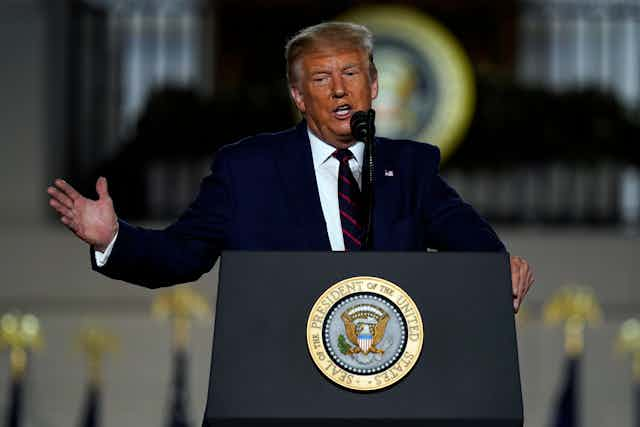Donald Trump delivered his second Republican Party acceptance speech from the White House on Aug. 27, shattering the norm that presidents do not campaign at the public’s expense, and describing a nation in crisis.
Trump spoke of internal enemies intent on destroying the American way of life and offered himself as the nation’s only protection against widespread rampaging violence.
It was a speech meant to draw a stark contrast between Trump’s view of America and what he portrayed as his Democratic opponent Joseph Biden’s view of America.
I’ve been analyzing Trump’s rhetoric since 2015. I wrote about Trump’s appeal to authoritarian voters at his 2016 nomination acceptance speech in my new book, “Demagogue For President: The Rhetorical Genius of Donald Trump.”
This year’s speech was a repeat performance.
Trump repeatedly tried to create a sense of urgency about his reelection, calling this the “most important election in the history of our country.”
Trump said that “if the left gains power, they will demolish the suburbs, confiscate your guns, and appoint justices who will wipe away your Second Amendment and other Constitutional freedoms.”
“No one will be safe in Biden’s America,” Trump warned.
Biden borrowed from Trump’s playbook, tweeting out a response to the speech.
‘A wicked nation’
The months long protests against police violence and systemic racism against African Americans, the movement to pull down Confederate monuments, and even The New York Times’ 1619 Project provided the background for Trump’s attack on Biden’s view of America and his defense of his own record in office.
Trump claimed that “Joe Biden and his party repeatedly assailed America as a land of racial, economic and social injustice.” He told his audience that “in the left’s backward view, they do not see America as the most free, just, and exceptional nation on earth. Instead, they see a wicked nation that must be punished for its sins.”
In so doing, Trump’s speech rejected the concerns that a majority of Americans have about systemic racism while it offered solace to those Americans who think that the movement has gone too far.
Trump spoke in stark terms about the choice facing Americans in November. “This election will decide whether we will defend the American Way of Life, or whether we allow a radical movement to completely dismantle and destroy it,” he said.
And Trump promised to be the nation’s hero. He said that he would protect “the patriotic heroes who keep America safe,” while his opponents would “stand with anarchists, agitators, rioters, looters and flag-burners.”
He quoted one of his own memes, saying he is the only thing standing between vulnerable Americans and what he calls the nation’s dangerous enemies within. “Always remember,” he said, “they are coming after me, because I am fighting for you.”

Trump’s Republican nomination acceptance speech didn’t reach across the aisle to draw in the support of Democrats or Democrat-leaning Independents. It wasn’t a speech for all of America – it was a speech designed to appeal to Trump’s base and terrify them into voting for him. That’s authoritarian.

